Getting sober without AA can seem like a daunting task. Many people believe that joining Alcoholics Anonymous (AA) is the only way to achieve sobriety, but this is simply not true.
There are many alternative methods and strategies for getting sober without AA that are effective for individuals from all walks of life. In this guide, we will explore some of our favorite tips for successfully getting sober.
Whether you are looking to quit alcohol completely or just cut back on your drinking habits, this guide is here to help you along your journey towards a healthier and happier life. So let’s dive in!
Professional Counseling and Therapy
Going for alcohol addiction treatment through professional counseling and therapy is a great way to start your journey toward sobriety. These services offer personalized support and guidance. They help you address the root causes of your addiction and develop healthy coping mechanisms.
A trained therapist or counselor can also provide you with valuable tools for managing:
- triggers
- cravings
- negative emotions
All these may arise during your recovery journey. They can also help you stay accountable and motivated, making it easier for you to achieve and maintain sobriety.
Support Groups
Support groups groups provide a safe and non-judgmental environment where individuals struggling with alcohol addiction can share their experiences, struggles, and triumphs. Joining a support group can help you feel less alone in your journey and provide you with a strong support system.
These groups also offer valuable advice, resources, and encouragement to help you stay on track towards sobriety. The best part is that there are many different types of support groups available, so you can find one that suits your needs and preferences.
Mindfulness Practices
Practicing mindfulness
can also be extremely beneficial when trying to get and stay sober. Mindfulness involves being present in the moment and focusing on your thoughts, feelings, and sensations without judgment.
This practice can help you become more aware of your triggers and cravings. This makes it easier to resist them. Mindfulness can also help reduce stress and improve your overall mental well-being. This can be essential for staying sober long-term.
Self-Help Resources and Books
There are also many self-help resources available for individuals looking to get sober without AA. Books, podcasts, online forums, and apps can provide you with valuable information and tips on how to overcome addiction and maintain sobriety.
Reading personal stories of individuals who have successfully gotten sober can also be incredibly inspiring and motivating. This can also help you feel less alone and give you hope for your own journey towards sobriety.
Create and Follow a Personalized Plan
Everyone’s path to sobriety is different, which is why it’s important to create a personalized plan that works for you. This may involve setting specific goals, finding healthy outlets and hobbies to replace drinking, and creating routines that support your sobriety.
Having a clear plan in place can help you stay focused and motivated on your journey towards sobriety. It can also serve as a reminder of why you decided to quit alcohol in the first place.
Getting Sober Without AA is Possible
Getting sober without AA is not only possible. It is also a common and successful approach toward achieving sobriety. It may not always be easy, but the benefits of sobriety are worth it.
So if you’re ready to take the first step towards sobriety, remember that you are not alone and there is help available for you. Keep pushing forward, stay strong, and know that a sober lifestyle is within reach.
Should you wish to read more, visit our blog.
Copyright © 2024 California Business Journal. All Rights Reserved.
Related Posts




